Business Support for those affected by Covid-19
The Australian Government has announced measures to support businesses impacted by the coronavirus (COVID-19). If you’re an employer, learn what your business can get and where to go for help.
- Job keeper payment
- Temporary cash flow support
- Casual employees
- Employer obligations
- Super guarantee payments
Stay Informed
Download the official government “Coronavirus Australia” app in the Apple App Store or Google Play, or join our WhatsApp channel on iOS or Android.
Blank
ACCC ScamWatch - Covid-19 Scams
Scamwatch has received over a thousand coronavirus-related scam reports since the outbreak. Common scams include phishing for personal information, online shopping, and superannuation scams.
If you have been scammed or have seen a scam, you can make a report on the Scamwatch website, and find more information about where to get help.
Scamwatch urges everyone to be cautious and remain alert to coronavirus-related scams. Scammers are hoping that you have let your guard down. Do not provide your personal, banking or superannuation details to strangers who have approached you.
Scammers may pretend to have a connection with you. So it’s important to stop and check, even when you are approached by what you think is a trusted organisation.
Visit the Scamwatch news webpage for general warnings and media releases on COVID-19 scams.
Phishing – Government impersonation scams
Scammers are pretending to be government agencies providing information on COVID-19 through text messages and emails ‘phishing’ for your information. These contain malicious links and attachments designed to steal your personal and financial information.
Examples
Fake MyGov texts
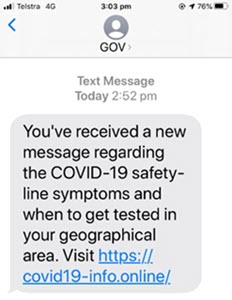
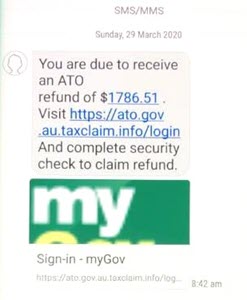
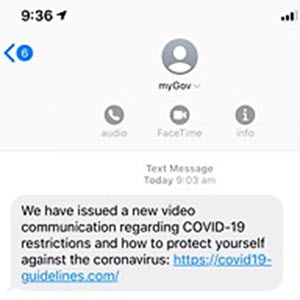
Fake government subsidy phishing scam
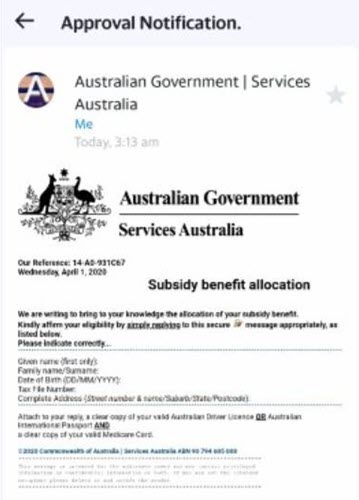
Fake ATO tax credit scam

Fake economic support payment text

Phishing – Other impersonation scams
Scammers are pretending to be from real and well known businesses such as banks, travel agents, insurance providers and telco companies, and using various excuses around COVID-19 to:
- ask for your personal and financial information
- lure you into opening malicious links or attachments
- gain remote access to your computer
- seek payment for a fake service or something you did not purchase.
Fake bank phishing text
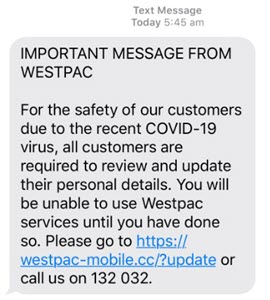
Fake insurance phishing text

Superannuation scams
Scammers are taking advantage of people in financial hardship due to COVID-19 by attempting to steal their superannuation or by offering unnecessary services and charging a fee.
The majority of these scams start with an unexpected call claiming to be from a superannuation or financial service.
The scammers use a variety of excuses to request information about your superannuation accounts, including:
- offering to help you access the money in your superannuation
- ensuring you’re not locked out of your account under new rules.
- checking whether your superannuation account is eligible for various benefits or deals.
Scams targeting businesses
Scammers are using COVID-19 in business email compromise scams by pretending to be a supplier or business you usually deal with.
Scammers are using COVID-19 as an excuse to divert your usual account payments to a different bank account. Your payment goes to the scammer instead of the real business.
Example of a business email compromise scam
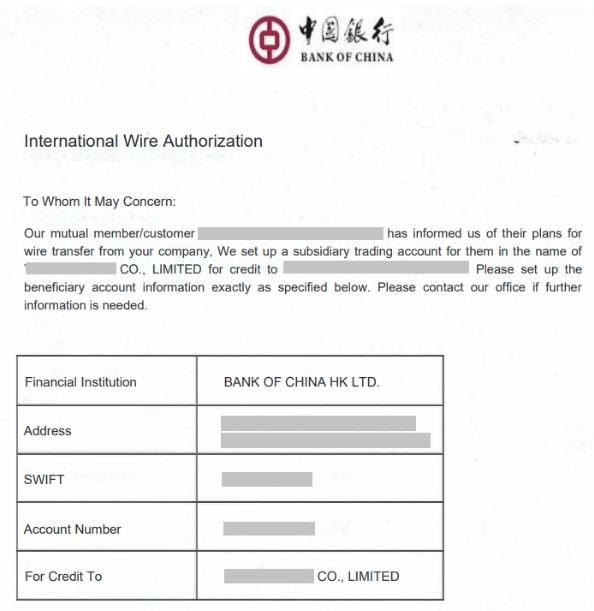
Various Posters for Businesses
Coronavirus and Australian workplace laws
FairWork Ombudsman encourage employees and employers to work together to find the most beneficial and workable solutions that suit their individual workplaces and circumstances. Working together, there are various options to help business and employment continuity through this time.
Continuity of business is a significant issue for employers and their employees during this unprecedented and difficult time.
Click on each section below for information and links to information and advice about rights and responsibilities at work during coronavirus.
Health and Safety in the workplace Arranging Flexible Work Flexibility in the Workplace Temporary changes to workplace laws during coronavirus Pay and leave during coronavirus Unpaid pandemic leave and annual leave flexibility in awards Stand down during coronavirus Ending employment & redundancy during coronavirus What if an employee wants to stay home as a precaution? Can an employer direct an employee to use the COVIDSafe app? Can employees be directed not to travel?
Covid-19 Early release of superannuation
If you have been financially affected by COVID-19, you may be able to access some of your superannuation early.
Eligible citizens and permanent residents of Australia or New Zealand can apply for up to $10,000 in 2019–20 and up to a further $10,000 in 2020–21.
Eligible temporary residents are able to apply once to access up to $10,000 of super in 2019–20.
Applications can be submitted online through myGov:
- until 30 June 2020 for the 2019–20 year
- between 1 July 2020 and 24 September 2020, for the 2020–21 year.
You will not need to pay tax on amounts released and will not need to include these amounts in your tax return.
JobKeeper Explained
Business Station are busy delivering live business forums and interviews with key business people. They have now set up a YouTube channel with the recordings. In this recording you’ll hear from the Hon. Michaelia Cash, Minister for Employment, Skills, Small and Family Business explaining the JobKeeper payment and where to go for further business information and advice.
JobKeeper payment – employee nomination notice
If you are a business and have been impacted by the coronavirus (COVID-19), you may be eligible to access the JobKeeper Payment. Before you enrol for the JobKeeper Payment, you need to complete the JobKeeper employee nomination notice to:
- notify your eligible employees that you intend to participate in the scheme
- ask them if they agree to be nominated and receive payments from you as part of the scheme.
Next steps:
- Download the JobKeeper employee nomination notice (PDF 188KB) or
- JobKeeper employee nomination notice (DOCX 67KB) accessible format.
- Both you and the nominated employee need to complete the form. You do not need to send this notice to us, however you should keep a record to document that your employee has agreed that you claim the JobKeeper Payment for them.
Note: You should not use this JobKeeper employee nomination notice if you are intending to claim JobKeeper payments for an eligible business participant for example a partner in a partnership, an adult beneficiary of a trust or a shareholder or director of a company or a sole trader. A different nomination process will be required.
If you can’t download the form you can:
- order a copy online – search for NAT 75294-04 2020
- obtain a copy by phoning our publications ordering service on 1300 720 092.
COVID-19: Cyber Security Tips When Working From Home
This guidance outlines key cyber security practices for people who are working from home.
The COVID-19 pandemic has resulted in many people working from home for the first time. Working from home has specific cyber security risks, including targeted cybercrime. When compromised, unauthorised access to your stored information can have a devastating effect on your emotional, financial and working life.
WA Government Small Business Stimulus/Relief Package
Consumer Protection FAQ - Commercial Tenancy
How are commercial landlords and tenants affected by the moratorium on evictions?
New legislation has been developed to put into place a six month moratorium on evictions and other measures relating to commercial tenancies in order to address the financial impacts of the COVID-19 coronavirus, including introduction of a code of conduct.
The aim of the legislation is to help small and medium-sized enterprises that are in financial distress to survive the current restrictions.
The Commercial Tenancies (COVID-19 Response) Bill 2020 will introduce:
- a six month moratorium on evictions due to non-payment of rent;
- a freeze on rent increases;
- restrictions on penalties for tenants who do not trade or reduced their trading hours;
- prohibitions on charging interest on rent arrears;
- the introduction of a dispute resolution process; and
- an ability for government to prescribed a code of conduct
How does the commercial tenancy code of conduct work?
National Cabinet has agreed to introduce a code of conduct to provide a framework for negotiations in relation to commercial leases where the tenant is suffering financial distress as a result of the COVID-19 pandemic.
The proposed code requires that negotiations must to be carried out in good faith by both parties with a view to reaching agreement on temporary changes to leasing arrangements during the moratorium period.
The impact the COVID-19 coronavirus restrictions have had on the tenant’s business with regard to revenue, expenses and profitability will be taken into consideration when determining and implementing appropriate deferrals, reductions or waivers of rent as well as the sharing of other costs.
